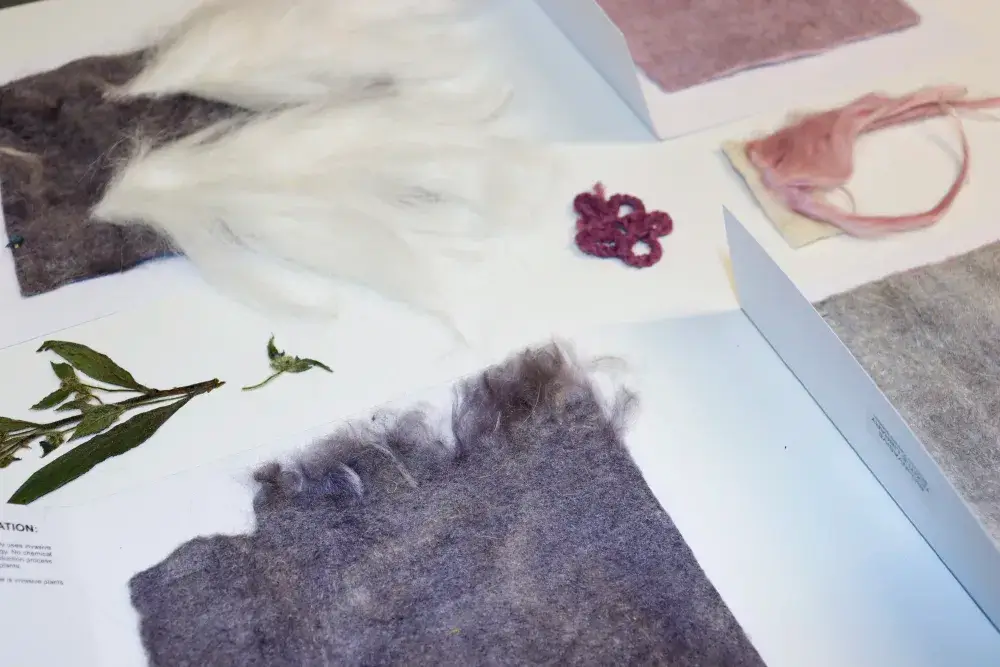Central Saint Martins x The Mills Fabrica Innovation Award 2023: Xue Chen
Partner Post by Central Saint Martins
The Mills Fabrica collaborates with Central Saint Martins UAL, a globally renowned center for arts and design education with a strong reputation in sustainable fashion innovation, with an aim to foster future innovators and recognize exceptional emerging talents in sustainable design and technology. Each year, The Mills Fabrica Innovation Award is given to a graduating Central Saint Martins student who has demonstrated outstanding creativity and vision in developing a material innovation project.
Learn more about 2023 winner, Xue Chen, and her project “Bio-Invasive Textile Library”.
MA Biodesign graduating student Xue Chen has won The Mills Fabrica Innovation Award 2023 for her final project Bio-Invasive Textile Library. Xue uses London’s invasive plants as raw materials to create alternative fur fibres and dyes, proposing a systemic solution to biodiversity loss and inhumane animal treatment in fashion.
A win-win for ecology and fashion, Xue uses invasive plants and fashion technology innovations to develop furs that require zero-waste dyeing. The technical production processes and textiles wasted during this production are then used to develop new bio-invasive materials.
By innovating diverse technologies such as “implanting”, “felting” and “spinning”, the ambition is to provide fashion designers with a library of solutions. The project has been developed in collaboration with BA Fashion knitwear designer Silvia Acien, to demonstrate the potential of the Bio-invasive Textile Library as a real-life solution for fashion designers.

For raw materials, Xue conducted a comprehensive inventory of invasive plants in London and created a map of invasive plant distribution. The project exclusively employed these invasive plants for all dyeing procedures, contributing to species management and mitigating biodiversity loss in the area.
Instead of using chemical components, she uses clubmoss as a substitute for chemical mordants, and the various invasive plants are reused for multiple dyeing sessions, resulting in a range of colours. The fibre component of the project incorporates invasive plant-based materials such as ramie fibre and nettle fibre.
I'm grateful for the Mills Fabrica Innovation Award, enabling me to bring my design to fashion industry. I'm excited about the final phase of material testing for the Bio-invasive series at The Mills Fabrica. With the support of the start-up team, I aim to establish a bio-fashion solutions center focused on regional biodiversity and humanitarian aspects, providing more win-win solutions.
The Mills Fabrica is thrilled to partner with the MA Biodesign course at Central Saint Martins again to support the next generation of material innovators. It is inspiring to see creative minds like Xue Chen pushing the boundaries of what is possible with sustainable fashion, and we look forward to continuing to empower more young talents through our resources and network of ecosystem players.
Xue's biodesign process exemplifies the trajectory of a biodesigner. A student that engaged with a specific species; developing her own bio practice methods, and achieving a high level of prototyping iterations, scaling them in great detail and craftsmanship. Xue's hard work and dedication to her project was truly remarkable to witness
Xue’s craftsmanship involves the use of two innovative machines: an "Implanting" machine and a "Flocking" machine. The Implanting Machine represents a groundbreaking technology capable of integrating any type of fibre into any fabric, using a mechanical structure inspired by hair transplant surgery. Simulating crochet patterns, the needle mechanism enables the precise placement of fibres at the back of the fabric. This portable machine enables various patterns and designs, facilitating versatility in fibre implantation.
The Flocking Machine is a modified device with a redesigned needle to accommodate the unique characteristics of nettle and ramie fibres, enabling the transformation of these fibres into felts akin to woolen coat fabrics. By combining these two machine technologies with knitting and spinning techniques, as well as employing a regenerative production process, the project successfully amalgamates diverse fabric forms.
Celebrating work that combines academic excellence with a focus on material innovation and sustainability, The Mills Fabrica Award of £1,000 and a three-month residency in their lab in either London or Hong Kong gives Xue time and freedom to continue working on her innovation.